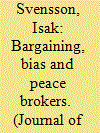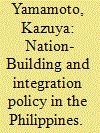|
|
|
Sort Order |
|
|
|
Items / Page
|
|
|
|
|
|
|
| Srl | Item |
| 1 |
ID:
076877


|
|
|
|
|
| Publication |
2007.
|
| Summary/Abstract |
What is the role of biased mediators in bringing belligerents to a negotiated settlement in internal armed conflicts? Previous research has suggested that biased third parties may mitigate commitment problems between parties, by serving as guarantors for the weakening side. This article contributes to the previous debate by distinguishing, theoretically and empirically, between government- and rebel-biased mediation. When belligerents in internal armed conflicts consider ending their armed conflict through a negotiated settlement, the government stands to relinquish authority, whereas the rebels stand to gain opportunities - legitimacy, time and access to official structures - that can be exploited in the post-agreement future. Hence, in the pre-settlement phase of the conflict process, it is above all the rebels that have problems committing to peace. The author argues that government-biased mediators can decrease the fears of the government and thereby mitigate the rebels' commitment problems. Using new data on the dyadic level covering all intrastate armed conflict in the period 1989-2003, this article examines states, organizations and individuals that are mediating in states' internal conflicts. The empirical analysis supports the above-mentioned argument. Mediators on the side of the government have a positive effect on negotiated settlements, while rebel-biased mediators have no significant effect
|
|
|
|
|
|
|
|
|
|
|
|
|
|
|
|
| 2 |
ID:
076879


|
|
|
|
|
| Publication |
2007.
|
| Summary/Abstract |
This article examines the changing role of Irish-America in the Northern Ireland peace process and contends that it played a pivotal role in the Provisional IRA's announcement in July 2005 that it was ending its campaign of violence. It is argued here that the IRA decision to end its campaign was influenced considerably by three separate but interrelated factors: (1) the internationalization of Northern Ireland by successive US governments beyond the limits of domestic UK politics; (2) the evolution of the Irish-American political lobby in the 1990s, from outcome-driven objectives to process-driven and attainable goals; and (3) the current leadership of the Irish republican movement has orientated itself around the changing social fabric of Irish-America, which is smaller and less cohesive than in the past. More broadly, the article demonstrates the way in which the dynamics of internal conflict can be altered by external actors via the use of `soft power' strategies, in a manner that can assist the development of a peace process.
|
|
|
|
|
|
|
|
|
|
|
|
|
|
|
|
| 3 |
ID:
062542


|
|
|
|
|
| Publication |
Feb-Apr 2005.
|
|
|
|
|
|
|
|
|
|
|
|
|
|
|
|
| 4 |
ID:
076878


|
|
|
|
|
| Publication |
2007.
|
| Summary/Abstract |
The Philippines can be considered a country where successive governments have sought to create a single nation by implementing integration policies. In this article, two formal models are developed -the modernism model and the historicism (primordialism or essentialism) model - to suitably analyze the national integration policy of the Philippines. The analysis reveals that (1) the post-independence national integration policy of the Philippines cannot be regarded as being successful; (2) national integration in the Philippines will continue to be difficult; (3) no deterministic argument can be made regarding the relationship between mobilization and national cleavage; and (4) the modern nation should not be regarded as an extension of pre-modern ethnic groups but as a new identity group that is formed through the process of modernization. In addition, the mathematical implications of the two models are derived. The modernism model implies that (1) in some cases, a ruling group that is in the majority at the time of independence can maintain its position even if it cannot assimilate a majority of the underlying people after independence; (2) in some cases, a ruling group that is not in the majority at the time of independence cannot attain a majority even if it is able to assimilate a majority of the underlying people after independence; and (3) a larger ruling group is not always capable of promoting greater integration than a smaller one can. On the other hand, the historicism model implies that the size of the underlying ethnic group that will comprise the ruling group when mobilized is the key to the success or failure of national integration.
|
|
|
|
|
|
|
|
|
|
|
|
|
|
|
|
| 5 |
ID:
076876


|
|
|
|
|
| Publication |
2007.
|
| Summary/Abstract |
The authors examine a standard gravity model of international commerce augmented to include political as well as institutional influences on bilateral trade. Using annual data from 1980-2001, they estimate regression coefficients and residual dependencies using a hierarchy of models in each year. Rather than gauge the generalizability of these patterns via traditional measures of statistical significance such as p-values, this article develops and employs a strategy to evaluate the out-of-sample predictive strength of various models. The analysis of recent international commerce shows that in addition to a typical gravity-model specification, political and institutional variables are important. The article also demonstrates that the often-reported link between international conflict and bilateral trade is elusive, and that inclusion of conflict in a trade model can sometimes lead to reduced out-of-sample predictive performance. Further, this article illustrates that there are substantial, persistent residual exporter- and importer-specific effects, and that ignoring such patterns in relational trade data results in an incomplete picture of international commerce, even in the context of a well-established framework such as the gravity model
|
|
|
|
|
|
|
|
|
|
|
|
|
|
|
|
| 6 |
ID:
076875


|
|
|
|
|
| Publication |
2007.
|
| Summary/Abstract |
The literature on international conflict is divided on the impact of nuclear proliferation on state conflict. The optimists' argument contends that nuclear weapons raise the stakes so high that states are unlikely to go to war when nuclear weapons enter the equation. The pessimists rebut this argument, contending that new proliferators are not necessarily rational and that having nuclear weapons does not discourage war but rather makes war more dangerous. Focusing on one observable implication from this debate, this article examines the relationship between the severity of violence in crises and the number of involved states with nuclear weapons. The study contends that actors will show more restraint in crises involving more participants with nuclear weapons. Using data from the International Crisis Behavior (ICB) project, the results demonstrate that crises involving nuclear actors are more likely to end without violence and, as the number of nuclear actors involved increases, the likelihood of war continues to fall. The results are robust even when controlling for a number of factors including non-nuclear capability. In confirming that nuclear weapons tend to increase restraint in crises, the effect of nuclear weapons on strategic behavior is clarified. But the findings do not suggest that increasing the number of nuclear actors in a crisis can prevent war, and they cannot speak to other proliferation risks.
|
|
|
|
|
|
|
|
|
|
|
|
|
|
|
|
|
|
|
|
|